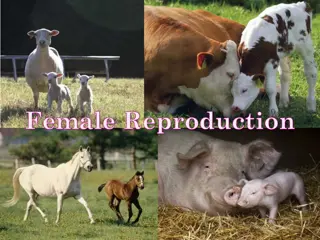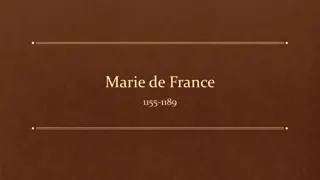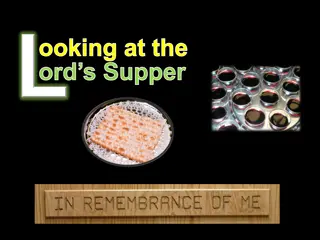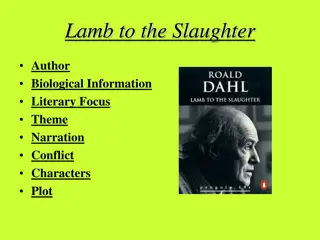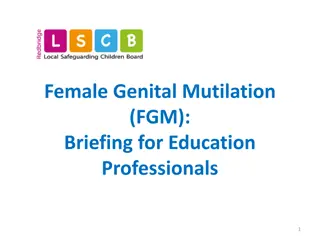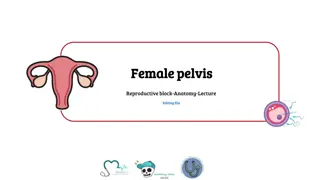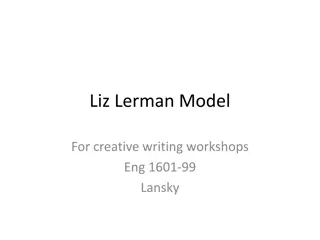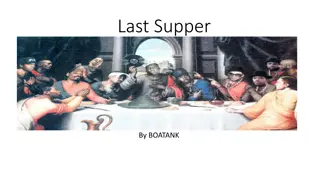Exploring Betrayal and Female Relationships in "Last Supper" by Liz Lochhead
Liz Lochhead challenges traditional perceptions of betrayed women in her poem "Last Supper." Instead of portraying the woman as a victim, she depicts her preparing a final meal to mark the end of the relationship, with a focus on female camaraderie and uncovering lies. Lochhead uses free verse and onomatopoeia to emphasize the friends' behavior, purposely lacking punctuation to symbolize relationship imbalance. The use of "(For ever)" signifies the woman's finality in ending the relationship, drawing religious parallels to infidelity.
Download Presentation

Please find below an Image/Link to download the presentation.
The content on the website is provided AS IS for your information and personal use only. It may not be sold, licensed, or shared on other websites without obtaining consent from the author. Download presentation by click this link. If you encounter any issues during the download, it is possible that the publisher has removed the file from their server.
E N D
Presentation Transcript
In this poem, Lochhead challenges our usual perceptions of women who have been betrayed by a partner who has been unfaithful.
Instead of presenting the woman as a victim, she is depicted preparing a final meal to mark the end of the relationship. She portrays herself and her girlfriends later divulging themselves on the lies of her ex-lover.
With this, she renders a portrayal of female relationships in today s society.
Last Supper is written in free verse and separated into four stanzas. She uses very gruesome terms of onomatopoeia to idealise the greedyness and animalistic nature of the friends.
She purposely lacks in punctuation to symbolise the unbalance in the relationships and situations.
The use of (For ever) strongly conveys how the woman is absolutely definitive in her belief that the relationship has no hope for a future.
These words are reminiscent of the phrase 'youve made your bed now lie on it', used to convey the idea that sometimes we need to endure difficult situations that have arisen because of our own actions.
This is a religious reference, to Judas betraying Jesus at the Last Supper. She uses this comparison to show us how infidelity in her relationship is unforgivable.
In this stanza, Lochheads focus shifts away from the meal she is preparing for her unfaithful lover to her anticipation of enjoying a meal of a different kind.
This is used to highlight how the literal meal with her man is now finished, and she is set and ready to speak rudely about him to her friends
Extending the food metaphor, she describes the very good soup/she could render from the bones of their affair which she describes as substantial and extra/tasty if not elegant.
A much more sinister mood is conveyed in stanza 3 with her poetic techniques and references to MacBeth s witches.
The language is deliberately gruesome throughout. The verbs spitting and gnawing emphasise the women s determination to savour and pick over every detail of this failed romance. The alliteration Lochhead uses with c highlights the frailness and witch like nature of the woman, being a crispy hard sound.
This conveys how they plan to enjoy this meal slowly, and unravel and pick at every single mishap and negative feature of his This be physical or in terms of their relationship They have no remorse. There is a mood of viciousness in the way that the plan to devour his flaws.
Petit-Gout translates to little taste This strangely contrasts with the ideas Lochhead gave us in the previous stanza about the girls plans for him. This may highlight their means to not look petty
Stanza 4 channels a link to the viciousness mentioned earlier and leaves the reader feeling shellshocked to an extent with the haunting finish.
Lochhead furtherly attempts to teach us about the girls feelings of triumph through the breakup. The use of splutter highlights an eagerness to speak.
The use of the word gorged clearly idealises the negative aspects of the friendship. They seem to depend on misery. The use of savage integrity creates a feeling of hypocrisy for the women, like they expect men to be unfaithful and are ready to put themselves on a pedestal for it.
The reference made to corbies (Crows) highlights how the woman plan to pick at the bones and the carcass until there s not a shred left.




